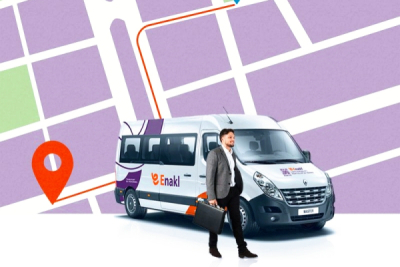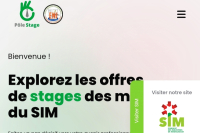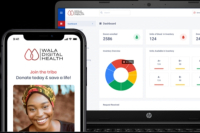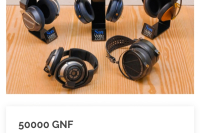
Solutions (583)
To simplify financial and commercial transactions for the Gambian population, a tech entrepreneur has taken the initiative to digitize several financial services by developing a tailor-made solution.
Waychit is a digital solution developed by a Gambian startup to revolutionize financial transactions in the country. The app allows users to pay for fuel, airtime, mobile data, purchases at merchants, internet bills, and insurance—all through its mobile platform. Founded in 2022 by Hassan Y. Jallow, the start-up operates out of Brufut, offering convenience and innovation to individuals and businesses alike.
The mobile app is available on both iOS and Android and has already been downloaded over a thousand times, according to Google Play Store data. After downloading the app, users can create an account by entering their personal details. They are then granted access to all the services provided by the fintech, including a digital wallet that can be topped up to make online purchases at affiliated shops.
Waychit also offers tailored services for businesses. For instance, companies can use its digital fuel vouchers, enabling employees to refuel at partner gas stations hassle-free—an efficient alternative to physical vouchers that can be misplaced or forgotten.
"Waychit is a payment aggregator in The Gambia offering customized payment solutions for businesses. Our goal is to make payments easy and convenient, whether it’s paying, getting paid, or shopping," the start-up explains.
In July 2024, Waychit was selected as part of the inaugural cohort of the Timbuktoo Fintech Hub, a project supported by African nations and the United Nations Development Programme (UNDP). It joined 41 other African fintechs in this initiative aimed at fostering innovation across the continent.
By Adoni Conrad Quenum,
Editing by Sèna D. B. de Sodji
To help young Moroccans, both graduates and non-graduates, find employment, a tech entrepreneur has developed a tailored solution.
JobUp, a digital solution developed by a Moroccan startup, allows users to easily find service providers for everyday needs across the country.
Founded in 2020 by Mohamed Ennamli, JobUp was born out of the challenges faced by young graduates entering the job market during the COVID-19 pandemic. "JobUp is a career accelerator for young graduates seeking to enter the job market," Ennamli said. "With the lockdown and its impact on the job market, the application became a necessity, as it serves all job seekers and improves their financial situation."
The solution includes a mobile application available on both iOS and Android, which has been downloaded more than 100,000 times, according to Play Store data. Users create an account and set up their profiles within the app. Service seekers post ads with detailed descriptions of their needs, while interested providers apply. Users then select the provider that best suits their needs and budget, scheduling the service at the agreed-upon location, date, and price.
Service providers also create detailed profiles within the app, showcasing their expertise and services offered. The platform connects users with a wide range of professionals, including hairdressers, cooks, plumbers, masons, and housekeepers.
Since its launch, JobUp has attracted more than 10,000 profiles and over 15,000 users across more than 20 cities throughout Morocco.
By Adoni Conrad Quenum,
Editing by Sèna D. B. de Sodji
To help Algerian businesses easily apply for tenders within the country, a tech entrepreneur has developed a tailored solution.
Rhinotenders, a digital solution developed by an Algerian startup, helps companies find the best suppliers to respond to their tenders.
Founded in 2016 by Saïd Hamdani, the Algiers-based startup offers a mobile application available exclusively on Android, which has been downloaded more than 5,000 times, according to Play Store data.
Suppliers register on the platform by providing the required information. They can then discover various opportunities that match their profiles and receive notifications (via email and the app) whenever a new opportunity is posted.
Rhinotenders enables users to submit bids and quotes online with supporting documents, track projects and preferred companies, view buyer profiles with their project histories to improve commercial prospecting, and access a complete daily list of tenders in Algeria (without category restrictions) with advanced search features.
For companies, the process involves creating an announcement on the platform with all the required details, allowing Rhinotenders to identify suitable suppliers. Once this step is complete, suppliers submit their bids, and the company, through its dashboard on the app or web platform, selects the one that best meets its requirements.
The startup not only publishes tenders directly on the platform but also shares information about tenders available on the websites of public and private institutions, buyers, national and regional press, specialized publications, and official bulletins.
Since its launch, Rhinotenders claims to have 40,000 users and has published over 350,000 tenders.
Adoni Conrad Quenum
The solution aims to revolutionize the insurance sector in Africa. In 2022, it raised $1.5 million in pre-seed funding to develop its technology and support growth across the continent.
ETAP is a digital solution developed by a Nigerian startup, enabling users to purchase insurance policies in 90 seconds, file claims, process completed claims in just 3 minutes, and receive payouts quickly with a few clicks. Based in Lagos, the startup was founded in 2022 by Ibraheem Babalola.
Shortly after its launch, ETAP successfully raised $1.5 million in a funding round. The funds were used to develop its mobile application and support its growth. In a press release on Thursday, October 30, ETAP announced its expansion into Ghana through a partnership with the local subsidiary of South African insurer Hollard Insurance.
The mobile app is available on iOS and Android, with over 5,000 downloads on the Play Store, according to platform statistics. After downloading the app, users create an account to access the startup's services. ETAP offers both annual and short-term insurance coverage, ranging from one day to 28 days. Through the app, users can manage their insurance policies, renew them, and view their claims history.
The insurtech also rewards safe driving behavior with points for drivers who avoid accidents. These points can be redeemed for vouchers, fuel, movie tickets, concert access, and other attractive rewards at retail outlets. "You can accumulate these points to earn rewards at over 500 stores or compete with your friends and colleagues on the ETAP leaderboard," the startup explains.
By Adoni Conrad Quenum,
Editing by Sèna D. B. de Sodji
In an effort to reduce greenhouse gas emissions and traffic congestion, two tech entrepreneurs have developed a tailored solution to streamline urban and intercity travel.
Enakl, a digital platform developed by a Moroccan startup, connects travelers heading to the same destination with semi-collective transport providers, such as minibuses. The initiative aims to reduce traffic congestion and carbon emissions. Founded in 2022 by Samir Bennani and Charles Pommarede, the Casablanca-based company also operates an office in Paris.
On Tuesday, December 3, the startup announced it had successfully raised $1.4 million in a funding round. The funding will be used to develop intelligent collective transport solutions for daily commutes within and beyond Morocco.
“This funding allows us to deepen our impact in Casablanca, expand our reach, and accelerate the development of our technology, leveraging AI to optimize routes, enhance commuter experiences, and drive sustainable urban mobility solutions,” the co-founders told Disrupt Africa.
Enakl offers a mobile app, available on iOS and Android, which has already been downloaded over 1,000 times, according to Play Store data. After downloading, users create an account by providing their personal details. They can then plan a ride or trip in just a few clicks by entering their starting point, destination, and desired arrival time.
Based on this information, Enakl suggests the best option for a seamless journey. Users receive details about their transportation—typically a minibus—including the time and pickup point, located within walking distance of their specified location.
Currently managing more than 15,000 reservations per month, Enakl plans to expand into other Moroccan cities before venturing into additional markets across the African continent.
By Adoni Conrad Quenum,
Editing by Sèna D. B. de Sodji
The concept for the startup was conceived during the lockdown period. Three tech entrepreneurs, who were childhood friends, subsequently transformed this idea into a fully operational company.
Jobop is a digital solution developed by a Moroccan startup that enables companies to recruit temporary workers via its web platform. Based in Casablanca, the startup was founded in 2021 by Salim El Merrassi, Adil Zghaoui, and Mehdi Berrahou. In April 2022, it raised 10 million dirhams (approximately $1 million) to fuel its growth across the continent.
The platform operates exclusively through a web browser, with no mobile app currently available. Job seekers can register on the platform and complete their CVs in just three simple steps. "They are then contacted for an individual interview. Once the interview is validated, our platform suggests the most suitable temporary assignments for their profiles," explains co-founder Adil Zghaoui.
According to data published on the platform, Jobop is 30% cheaper than traditional temp agencies and can identify suitable candidates within an average of three hours. The startup gained traction in the post-COVID-19 period as more companies turned to temporary staffing for greater flexibility and responsiveness to market shifts.
"The challenge with temporary work is the lack of training for workers. Ultimately, we aim to establish sector-specific training schools to help workers secure permanent roles within companies and transition out of precarious employment," says Zghaoui.
Jobop also has ambitious plans for expansion across the continent. Beyond North Africa, it is eyeing cities such as Johannesburg in South Africa, Lagos in Nigeria, and Nairobi in Kenya as key targets for growth.
By Adoni Conrad Quenum,
Editing by Sèna D. B. de Sodji
The agency has launched a tailored solution to help young people seize professional opportunities.
Malagasy social organization Syndicat des Industries de Madagascar (SIM) unveiled, last week, Pôle Stage, a platform designed to connect young Malagasy graduates with internship opportunities.
"This initiative embodies SIM’s commitment to bridging the gap between education and employment," explained SIM President Tiana Rasamimanana during the launch.
Accessible via web browsers, Pôle Stage requires users to create an account to get started. They can either log in with existing credentials or register by filling out the required information and uploading a PDF version of their CV. Once their account is activated, users can browse for internships that match their field of study.
The platform offers advanced search filters, allowing users to narrow down opportunities by city, sector, or company. When an appealing offer is found, users simply click "Apply Now". They receive an email notification when a company downloads their CV from the platform's dashboard, with the subsequent steps handled directly between the candidate and the company.
To further support young professionals, SIM provides Pôle Stage training programs. Participants can upload certificates from these courses to their profiles to boost their chances of securing internships. Additionally, the platform features a blog offering practical tips and advice on topics like crafting compelling CVs and cover letters, acing job interviews, and navigating workplace dynamics.
By Adoni Conrad Quenum,
Editing by Sèna D. B. de Sodji
Developped by two tech entrepreneurs, the solution aims to help hospitals secure blood supplies more efficiently.
Wala Digital Health, a Ghanaian e-health startup, is streamlining how hospitals and blood banks order, receive, and manage blood supplies. Founded in 2019 by Dennis Addo and Kanyisola Oyeyinka, the company operates from Accra, Ghana, and Cambridge, USA, combining local impact with global innovation.
“We harness the power of social networks to boost blood product availability and leverage innovative digital solutions for processing, sharing, and delivery, combating the fatal consequences of blood shortages,” the platform explains.
The solution features a mobile app, available on iOS and Android, enabling blood donors to connect with the platform and schedule donations. Through extensive use of digital channels, including social media, Wala Digital Health has built a donor community of around 1,000 members. Donors earn digital tokens after each contribution, which can be redeemed for medical services.
Blood donations are processed and made available within 24 to 48 hours. “Whole blood is separated into components (red blood cells, platelets, and plasma). Red blood cells can be stored for up to 42 days, plasma can be frozen and kept for 12 months, while platelets must be used within five days,” the platform notes.
Hospitals and blood banks can easily access these products through the app to meet their supply needs. In recognition of its innovative approach, Wala Digital Health was among 36 start-ups selected for the regional rounds of the MEST Africa Challenge in 2022.
By Adoni Conrad Quenum,
Editing by Sèna D. B. de Sodji
Balancing professional and parental responsibilities has led many families to entrust their children to daycare centers, nurseries, or nannies. In Mali, a tech entrepreneur has introduced a tailored solution to address this challenge.
MaNounou is a digital platform developed by Malian startup La Classe de Bintou. Designed for parents, it connects them with qualified nannies for young children in their area. Founded by Bintou Doumbia and based in Bamako, the start-up addresses a growing need for reliable childcare solutions in Mali.
“The platform also enables daycare centers, preschools, and other childcare professionals to offer their services to parents in need. MaNounou provides unemployed young women with degrees the chance to train in early childhood care and apply their skills in a professional environment,” explains the startup.
The platform operates through a mobile app. After downloading the app, users create an account to access a range of services. These include viewing detailed nanny profiles—complete with experience, qualifications, schedules, and parent reviews—and using an integrated messaging system for secure, direct communication. Parents can also filter searches by specific criteria to find the ideal nanny for their needs.
To ensure the safety and quality of its services, MaNounou rigorously verifies all profiles on its platform. Hiring a nanny through MaNounou is formalized with contracts available for secure online signing, offering protection for both parties throughout the agreement period.
In 2024, MaNounou won the Malian stage of the Orange Social Entrepreneur Prize in Africa and the Middle East (POESAM), earning a prize of 5 million CFA francs (approximately $7,973) and a ticket to the international round of the POESAM competition.
Adoni Conrad Quenum
Startups operating in the e-commerce sector are thriving across Africa. In Guinea, a tech entrepreneur has discovered an innovative way to sell second-hand goods through his online marketplace.
Seconde Main 224 is a digital solution developed by a Guinean startup that connects people looking to sell used items with those interested in buying them. Founded by Youssouf Sylla and based in Conakry, the platform enables users to trade pre-owned goods conveniently.
"We help our users earn money from their old items while allowing others with limited budgets to afford what they need at a lower cost," explains the startup.
Unlike many modern platforms, Seconde Main 224 does not have a mobile application. Users access the service through a web browser, where they can create an account and browse a wide range of items listed by other users. The marketplace features categories such as clothing, shoes, electronics, books, furniture, and more.
Sellers upload pictures of their products directly to the platform, providing details such as the item’s name, price, photo, and a brief description. They also select the appropriate category before listing the product. A registered account is mandatory for listing or selling items.
The company’s business model hinges on its premium service, “booster mon bien” (Boost My Item),which generates revenue by increasing the visibility of selected products. "This service displays boosted items to a larger audience of potential buyers based on their usage history and interests," the startup notes.
In 2024, Seconde Main 224 gained recognition by finishing second in the Orange Social Venture Prize for Africa and the Middle East. Representing Guinea in the final round, the startup was awarded 60 million Guinean francs (approximately $6,962.75).
Adoni Conrad Quenum
More...
Formerly known as TopSet, the startup has pivoted its focus to fully dedicate itself to this new venture. This strategic shift is paying off, as the company has successfully secured funding to support its growth.
Lingawa is a digital solution developed by a Nigerian start-up, offering users the chance to learn African languages—specifically Igbo and Yoruba—through engaging and immersive online courses. The Lagos-based company was founded in 2022 by Frank Williams, Yvonne Williams, and Uche Azinge. It also operates offices in London, UK, and New York, USA.
In 2023, Lingawa integrated artificial intelligence into its platform to enhance the quality of its services. "AI is already at the core of our student-tutor matching system, but behind the scenes, we’ve started developing our own large African language models. The goal of these AI models is to ensure that between lessons, students can effectively complete homework and practice," said Frank Williams.
On Thursday, November 21, the start-up announced a $1.1 million funding round. The funds will support the development of a mobile app, the addition of more African languages to its curriculum, and the company’s expansion into other global regions. Frank Williams aims to introduce Zulu and Swahili to the platform by the first quarter of 2025. However, he acknowledges challenges in recruiting tutors, most of whom are based in Africa.
"We quickly realized there was a gap in language teaching expertise. What we do is identify native African language speakers with high potential and train them to become world-class language teachers. This includes soft skills training, learning science, and ensuring that lessons are engaging and fun," Williams added.
While waiting for the mobile app’s release, users can access Lingawa’s platform via a web browser. Registration is simple: users can either provide personal details or log in through their Google account. Once signed up, they can choose a language to learn and connect with a tutor. The program features five proficiency levels—beginner, elementary, intermediate, expert, and advanced—and offers various subscription packages. For instance, a weekly plan costs $18 for a single student or $22.50 for two learners.
“Our students begin speaking from their first lesson and often engage in comfortable conversations within six months to a year. Mastery depends on your commitment to learning and practicing,” the company explained.
Since its launch, Lingawa has seen significant growth, boasting approximately 3,000 learners and around 100 tutors.
Adoni Conrad Quenum
Across Africa, making a sustainable living from art is often a struggle, and Liberia is no exception. A local tech entrepreneur has decided to take on that challenge through technology.
Prime Music Store, a digital platform developed by a Liberian startup, offers users the ability to stream and listen to songs by Liberian artists, regardless of genre or popularity. Founded in 2023 by Losine Victory Sanyon, Jr., the startup is headquartered in Monrovia and aims to revolutionize the music industry in the country.
“My company seeks to address the challenges faced by emerging music creators,” explains Sanyon, Jr. “Our goal is to offer a platform that empowers Liberian artists at the starting point of their careers. We’ve implemented transparent royalty structures to ensure artists receive a larger share of revenue, providing them with financial freedom to focus on their music without worrying about financial difficulties.”
Prime Music Store operates through a mobile app available on both iOS and Android, with over 100 downloads reported on the Play Store. After downloading the app, users can create an account by providing some personal information, granting them access to the platform’s music catalog.
Based on their preferences, users can download and listen to a variety of songs from their favorite artists for a fee. To do so, they must first load funds into their digital wallet, enabling them to purchase songs directly on the platform. From their dashboard, users can view their account balance and personal catalog. Downloaded songs can be organized into playlists within the app and played offline.
In 2024, Prime Music Store garnered recognition by winning third place in Liberia at the Orange Social Venture Prize for Africa and the Middle East.
Adoni Conrad Quenum
In recent years, ride-hailing services have gained popularity across Africa. In Nigeria, two tech entrepreneurs have decided to enter the market by offering luxury ride-hailing services.
Wenzo is a premium ride-hailing solution developed by a Nigerian startup. The platform, launched in 2023 by Precious Okafor and Gbenga Fola-Alade, Wenzo operates offices in Lagos, Nigeria; Accra, Ghana; and Dover, Delaware, in the United States.
It offers an iOS-exclusive mobile app, where users create an account to access the service. Based on their location and destination, they are matched with drivers ready to provide their rides. Notably, Wenzo collaborates with various leisure destinations from beaches to restaurants to enhance the experience for users headed to these spots in its service areas.
Beyond standard rides, Wenzo allows bookings for events, such as weddings, conferences, or tourist outings, providing transportation for guests or speakers to select venues. Since its launch, the startup has not conducted any fundraising to fuel its growth.
In October, it was selected as one of ten early-stage startups to pitch at Angel Fair Africa in Nairobi, Kenya. Organized by Chanzo Capital in partnership with Startupbootcamp AfriTech, MEST Africa, Antler, iHub, and GrowthAfrica, the event offers Wenzo a chance to capture investor interest for potential future funding rounds.
Adoni Conrad Quenum
Many African smallholders face challenges transporting their crops to urban markets. Tech entrepreneurs are increasingly stepping up to address this issue.
Kilimo Fresh is a digital solution developed by a Tanzanian startup that enables consumers to buy fresh produce online while making it easier for farmers to sell their products. Based in Dar es Salaam, the startup was founded in 2018 by Baraka Chijenga.
To use the platform, customers must access the e-commerce website through a web browser. They can browse a wide range of fresh products, including grains, fruits, milk, and various types of flour. While initial purchases can be made without an account, registration is required to complete transactions.
Kilimo Fresh serves as an intermediary between farmers and consumers. "[...]Through its efficient distribution model, the company sources fresh produce directly from smallholder farmers, adds value through cleaning, sorting, and packaging, then delivers it to its customers' locations," the startup explains.
Beyond individual consumers, Kilimo Fresh also supplies small retailers daily. The startup launched this solution to reach a broader customer base and help combat food waste. Kilimo Fresh “offers farmers stable prices (20% higher than those offered by middlemen), direct market access for their crops, and reduced food waste through the use of cold chain and cold storage facilities.”
In October, Kilimo Fresh was selected to participate in Angel Fair Africa, a major tech business showcase. Earlier in the year, the company received the Digital Innovation in Agriculture Award at the Tanzania Digital Awards.
Adoni Conrad Quenum















